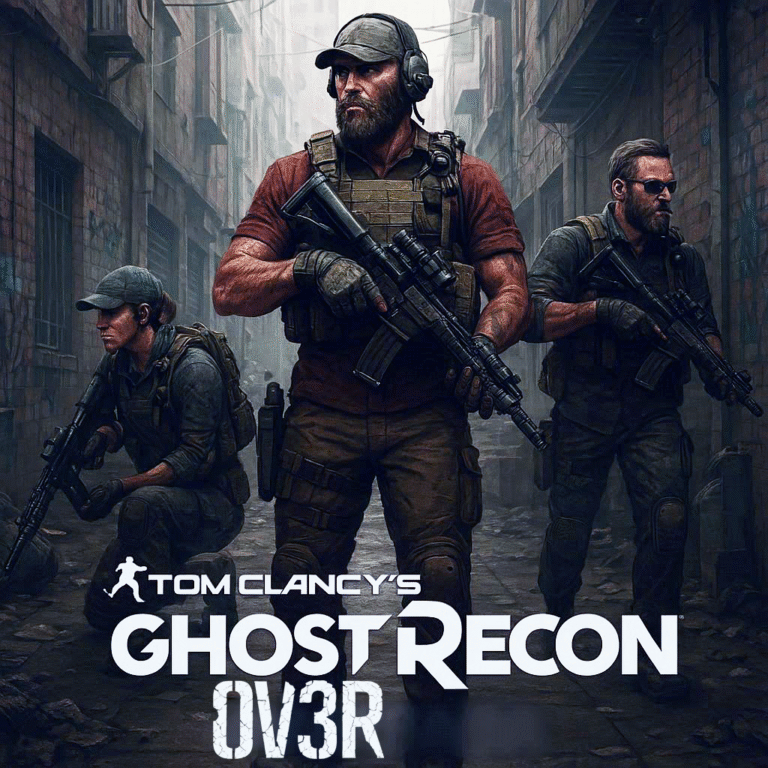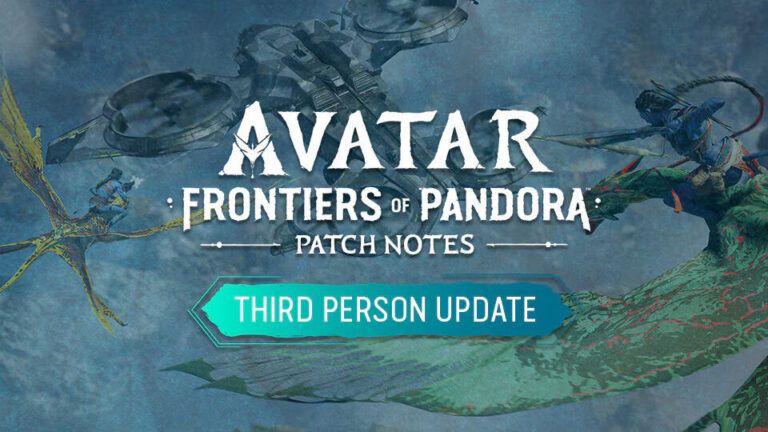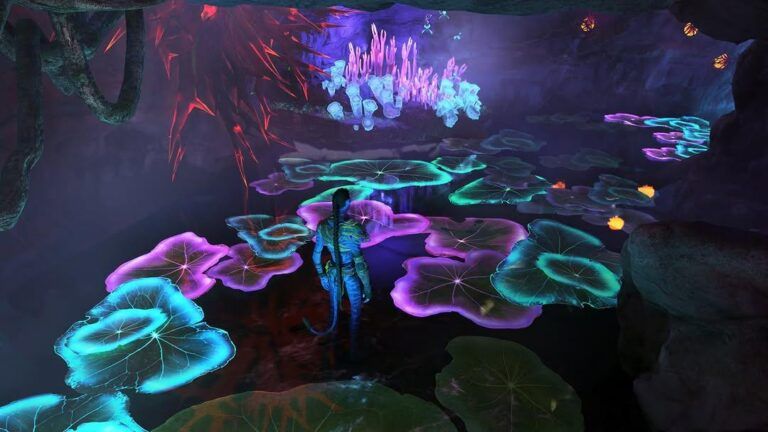Ubisoft Article: https://ghost-recon.ubisoft.com/game/en-ca/news-updates/2S1mCyksqVAnCVkRlixsFR/tom-clancys-ghost-recon-breakpoint-developer-qa-stealth-gameplay
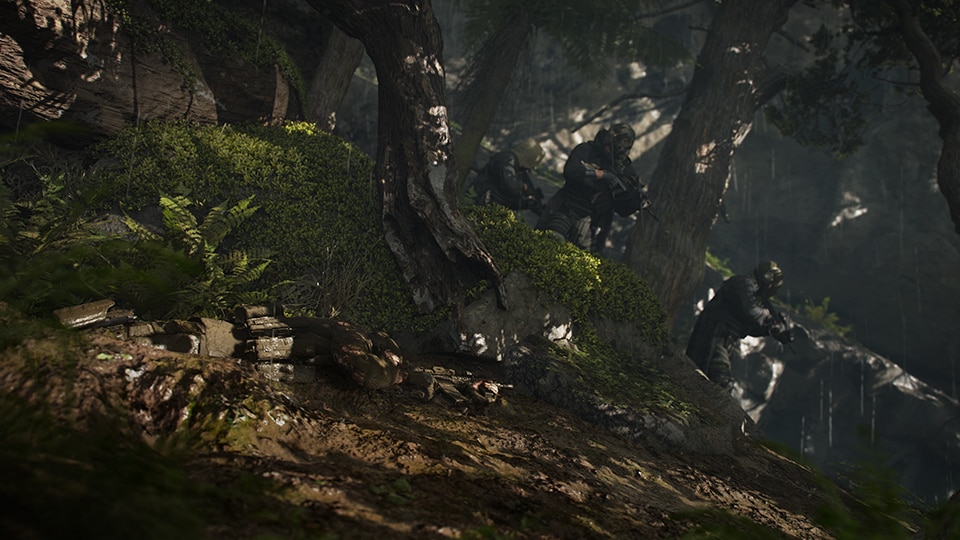
Tom Clancy’s Ghost Recon® Breakpoint is made to provide our players freedom of choice. Whether you want to go in guns blazing as a group, or maneuver as a silent lone operative, you can always play your way. We sat down with the developers on Tom Clancy’s Ghost Recon Breakpoint to discuss stealth and their best tips on how to approach enemies as a Ghost.
Q: Can you tell us about the design philosophy behind the stealth mechanics in Tom Clancy’s Ghost Recon Breakpoint?
As Ghosts, the first phase of stealth is reconnaissance. It is important for our players to be able to map out enemy locations, establish a plan, and then execute it.
We want to give players an accessible but credible stealth experience. A large part of that is enemy detection, which will rely heavily on context, such as ground materials for footsteps or vegetation, as well as a partial obstruction for visual detection.
If a player makes a mistake, the stealth challenge will increase, building up to visual detection. The detection ranges are directly linked to the Alert States of your enemies. For example, if an enemy hears footsteps that they don’t expect, they will become suspicious and the detection range will increase.
If you are spotted by an enemy and can take them down quickly before they alert their allies, you will not raise suspicion in a camp. However, some enemy archetypes have abilities that will be particularly challenging. You’ll want to watch out for the archetype that can quickly call in reinforcements if they are alerted.
Understanding the different enemy archetypes and how to deal with them strategically by using your environment, tools, and arsenal to your advantage is key to the stealth experience in Tom Clancy’s Ghost Recon Breakpoint.
We also want players to be able to reset the situation and “vanish” if they need to. Should things get a little too heated, players, can always hide from the enemies looking for them and wait for the stealth loop to go back to its initial state.
Q: How does enemy stealth detection work in-game?
There are multiple detection elements when it comes to enemy NPCs; you can group them under visual or sound detection. These detection elements work in tandem to pinpoint your location.
Visual detection is impacted by several factors:
-
Player Stance: If you’re prone, crouched, or sprinting – these will each have different impacts.
-
Enemy Alert State: The more enemies that become alerted or threatened, the more effective their detection range becomes.
-
Lighting: Being in a dark or brightly lit area will either help or hinder your stealth efforts. Remember, you can pick your time of day at the nearest Bivouac! If you approach a camp at night, take out some lights to make it harder for enemies to spot you.
-
Difficulty Level: Your choice of difficulty setting will impact how effective enemy visual detection is.
-
Level Differential: If you’re up against a well-equipped enemy that has a large advantage in level over your Ghost, their time to detect you will be shorter. You can still down higher-level human enemies in a headshot, but any mistakes you make in your approach are more likely to be noticed and punished.
Sound detection is split into two categories: player movement and weapon noise. Player movement is impacted by:
-
Speed: Crouching movements will be much harder to detect than a Ghost at a full sprint.
-
Player Stance:
-
Prone: Movement will be limited but you will also be very stealthy. Prone stance will generate no sound to be detected by an enemy.
-
Crouched: Players will be hard to hear as long as you’re not moving at maximum speed.
-
Running: You will move quickly but produce much more noise.
-
-
Ground Material: Some materials will amplify the range of the footstep sounds, watch where you step!
Weapon detection is impacted by:
-
Weapon Type: Different guns will have different noise levels. Make sure you check out your stats in the Gunsmith when choosing a stealthy loadout.
-
Silencer: If you have your silencer equipped, it will drastically reduce the sound detection range of your weapon, but it will not make your weapon completely silent.
Enemies will also be able to hear explosions, larger vehicles, and falling objects, depending on their size and distance.
Q: What are your best tips for playing in stealth?
Recon is your best friend!
When you’re playing stealthy you’ll want to identify and differentiate the types of enemies you’re facing. Enemy archetypes that can quickly call reinforcements or that have high vantage points can be especially dangerous left unaddressed.
Easy targets that are isolated from their allies can be taken out, like enemy snipers. Eliminating these enemies first, if possible, is a good starting point, as they often have a good visual spot and will limit your next stealth move if you don’t take them out.
Next, we recommend identifying targets that can be isolated, such as stationary units, entrance guards, and enemies in casemates.
Heavy targets, such as drones or large groups, will need to be dealt with carefully. Try to disperse the groups using your tools, or lure them to another location away from your target.
For example, you can use a Diversion Grenade to draw a group of enemies over a pre-placed mine to create a deadly combo.
You will also have opportunities available to you in camps, such as disabling generators, which will shut down lights and offensive installments like mortars and automated turrets.
The Sync Shot Drone is another useful tool in stealth. Quiet and effective, you can take out up to four enemies at once. Keep in mind that enemies will react if they see an ally die, so plan your targets strategically.
If you’re doing recon from afar, make sure you do it from cover. Staying near roads in Auroa will make it more likely for you to be spotted by patrols.
Q: How can players use the environment to their benefit?
The diverse environments of Auroa are some of your most reliable allies. Players can hide in vegetation and long grass to maintain their cover while moving around outdoor objectives.
The new prone camo feature provides similar bonuses and makes recon much safer. Look out for snow, mud, sand, and other types of terrain to cover yourself and make it hard for enemies to spot you.
Players can also use the carry body feature to take advantage of the vegetation. You can dump downed enemies into certain types of plants to hide them from their allies who might come on patrol or searching for a missing comrade.
Q: Are there any items that will aid the Ghosts in their stealth approach?
Ghosts have a lot at their disposal to enhance stealth gameplay. Your bread-and-butter tools for a silent approach will be:
-
Sync Shot Drones: A small drone that is deployed stealthily and will hover around the targeted NPC. If you shoot or command the drone to shoot, the drone will fire and instantly kill a human target. Three Sync Shot Drones can be deployed at a time!
-
Silencers: Almost all weapons can be equipped with a silencer on their muzzle to drastically reduce the noise made by fired bullets.
-
Diversion Grenades: A stealth item useful to make NPCs look away long enough to change position, approach for a lethal CQC, or interact with something quickly.
-
Cloaking Spray: This is the Panther class’s special item. The Ghost can spray themselves to become almost invisible against drones’ sensors for 60 seconds.
There are also items that, when used correctly, can make a difference in a covert infiltration.
-
Flash Grenades: These will blind any NPCs in the impact zone for a very long time. They’re dangerous in interior environments, but can also be devastating against NPCs disembarking from a transport. These grenades can be used when detected to cover a retreat and vanish.
-
Breaching Kit: A consumable used to breach a fence, a reinforced door, and select blockers. If you want to avoid heavily guarded main entrances of camps, the Breaching Kit will be essential in your arsenal.
-
EMP/Jammer Grenades: This will stun drones for several seconds and stop vehicles. Stunned drones are not alerted so they can be used to sneak around drone threats without raising the alarm. It’s important to note that this device will act over time, which means that any drone/vehicle that enters the device’s zone will be stunned/jammed.

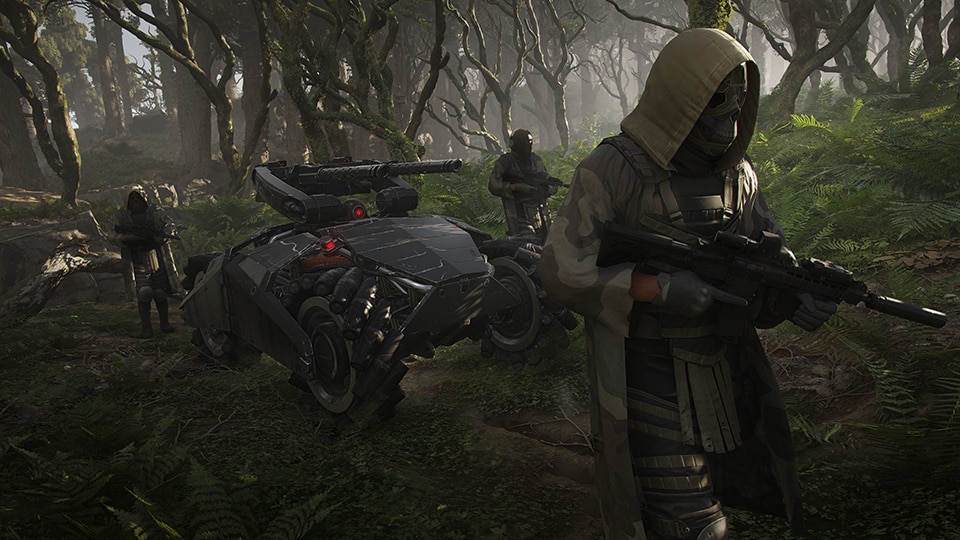
![[GRB] [News article] [Aug-16] RPG Elements 1](https://staticctf.akamaized.net/J3yJr34U2pZ2Ieem48Dwy9uqj5PNUQTn/2oWluhJ9cgnaCJMmgxrN56/6555049bfcda9fe4f25f5974f54b0230/GRB_MTDT_SCRN_09_RPG-Elements_4K_nl.jpg)
![[GRB] [News] [Aug 16th] RPG Elements 2](https://staticctf.akamaized.net/J3yJr34U2pZ2Ieem48Dwy9uqj5PNUQTn/6a8s4U9xjUWPJABTCEywwb/97bc59e259615d1f64e9bb8ecfa029f5/GRB_SCRN_CJ_Sniper_4K_nl.jpg)
